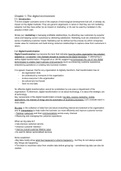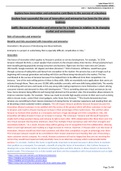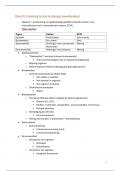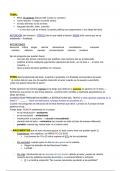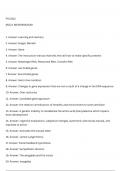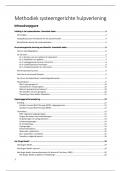Grammar: Verbs & General
1) Grammar Verbs
1.1. The Passive
1.1.1. Form
TO BE + PAST PARTICIPLE
PAST PRESENT MAIN VERB
am
was
SIMPLE is PAST PARTICIPLE
were
are
am being
was being
CONTINUOUS is being PAST PARTICIPLE
were being
are being
have been
PERFECT had been PAST PARTICIPLE
has been
PAST PRESENT
SIMPLE My camera was taken The machine is repaired
CONTINUOUS It was being built The car is being mended
The books have been
PERFECT The bill had been paid
packed
1.1.2. USE
, The Passive Tenses are used to show the importance of the
object of the active sentence.
Active: They delivered the goods yesterday.
Passive: The goods were delivered yesterday.
If the subject of the active sentence is important, it becomes
object of the passive sentence and is preceded by “BY”.
Active: The board have announced the decision.
Passive: The decision has been announced by the board.
Put the sentences in the passive. Transform the underlined words into the subject of
the passive sentence.
1. They are giving us all further training.
We are being given all further training
2. They sent her to China for six weeks.
She was sent to China for six weeks.
3. Nobody told me about the meeting.
I wasn’t told about the meeting
4. They still haven’t sent us a bill.
We still haven’t been sent the bill.
5. They promised us all sorts of concessions.
We were promised all sorts of concessions.
6. How much did they pay you?
How much were you paid?
7. Has anyone explained the procedure to you?
Has the procedure been explained to you?
Put the sentences in the passive. Use BY when the object of the active sentence is
important.
, 1. Have we finalized the details?
Have the details been finalized?
2. Someone will inform you if there’s a change.
You will be informed by someone if there’s a change.
3. Tom Quinn has contacted me.
I have been contacted by Tom Quinn.
4. The marketing manager briefed us.
We were briefed by the marketing manager.
5. Have they agreed on a procedure yet?
Has a procedure been agreed on yet?
6. When did they reach a decision?
When was a decision reached ?
1.2. Modal Verbs
1.2.1. Form
Modal verbs are special verbs which behave very differently from
normal verbs. Here are some important differences:
1. Modal verbs do not take “-s” in the third person.
“He can speak Chinese.”
“She should be here by 9:00.”
2. Modal auxiliary verbs are always followed by the
base form.
“I can read menus in Spanish.”
3. You use “not”
1.2.2. X
1.2.3. X
1.2.4. Conditionals
1.2.4.1. Form and Use
1) Grammar Verbs
1.1. The Passive
1.1.1. Form
TO BE + PAST PARTICIPLE
PAST PRESENT MAIN VERB
am
was
SIMPLE is PAST PARTICIPLE
were
are
am being
was being
CONTINUOUS is being PAST PARTICIPLE
were being
are being
have been
PERFECT had been PAST PARTICIPLE
has been
PAST PRESENT
SIMPLE My camera was taken The machine is repaired
CONTINUOUS It was being built The car is being mended
The books have been
PERFECT The bill had been paid
packed
1.1.2. USE
, The Passive Tenses are used to show the importance of the
object of the active sentence.
Active: They delivered the goods yesterday.
Passive: The goods were delivered yesterday.
If the subject of the active sentence is important, it becomes
object of the passive sentence and is preceded by “BY”.
Active: The board have announced the decision.
Passive: The decision has been announced by the board.
Put the sentences in the passive. Transform the underlined words into the subject of
the passive sentence.
1. They are giving us all further training.
We are being given all further training
2. They sent her to China for six weeks.
She was sent to China for six weeks.
3. Nobody told me about the meeting.
I wasn’t told about the meeting
4. They still haven’t sent us a bill.
We still haven’t been sent the bill.
5. They promised us all sorts of concessions.
We were promised all sorts of concessions.
6. How much did they pay you?
How much were you paid?
7. Has anyone explained the procedure to you?
Has the procedure been explained to you?
Put the sentences in the passive. Use BY when the object of the active sentence is
important.
, 1. Have we finalized the details?
Have the details been finalized?
2. Someone will inform you if there’s a change.
You will be informed by someone if there’s a change.
3. Tom Quinn has contacted me.
I have been contacted by Tom Quinn.
4. The marketing manager briefed us.
We were briefed by the marketing manager.
5. Have they agreed on a procedure yet?
Has a procedure been agreed on yet?
6. When did they reach a decision?
When was a decision reached ?
1.2. Modal Verbs
1.2.1. Form
Modal verbs are special verbs which behave very differently from
normal verbs. Here are some important differences:
1. Modal verbs do not take “-s” in the third person.
“He can speak Chinese.”
“She should be here by 9:00.”
2. Modal auxiliary verbs are always followed by the
base form.
“I can read menus in Spanish.”
3. You use “not”
1.2.2. X
1.2.3. X
1.2.4. Conditionals
1.2.4.1. Form and Use




